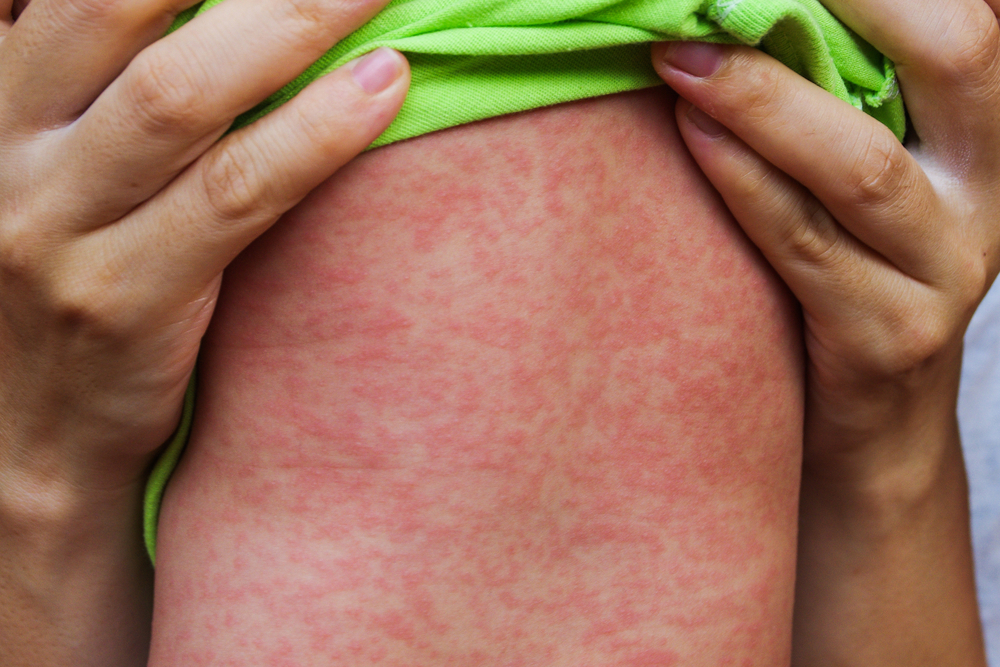By Mary Horrall, MD, pediatrician at The Portland Clinic.

Parents have plenty of things to worry about; following vaccine recommendations shouldn’t be one of them. The groups who oversee our pediatric immunization schedule (the Centers for Disease Control and Prevention, the Advisory Committee on Immunization Practices, the American Academy of Pediatrics) do their homework and are constantly monitoring the safety and efficacy of our vaccines. Yet, internet rumors continue to strike fear in parents, leading some to choose the known risks of diseases rather than vaccinate their children.
As a result, the measles, which was declared eliminated in the United States in 2000, is making a comeback. In 2019, a rising number of unvaccinated children led to the largest outbreak of measles in the U.S. since 1992.
Measles is a highly contagious disease, and our region is not immune to it. If you’re not convinced about the importance of vaccination, here are five things you need to know.
1. The MMR vaccine does not cause autism.
Many concerned parents still point to a now-discredited study, published more than 20 years ago, that suggested an association between the measles, mumps, and rubella (MMR) vaccine and autism. Although that study has long since been refuted, retracted and found to be fraudulent, the alarms it set off continue to ring on the internet. While that original study looked at only 12 children, two more-recent studies of more than half a million children each have found no link between MMR vaccination and autism.
2. The risks of measles far outweigh the risks of vaccination.
At its mildest, measles makes a child feel pretty crummy, starting out like the flu and progressing to a high fever, irritated eyes and a rash all over the body. At its worst, it causes ear infections (in about one in 10 children) that can lead to deafness; pneumonia (in one in 20); encephalitis (in one in 1,000); and death. Of every 1,000 children who get the measles, one or two will die.
By contrast, the risk of a severe allergic reaction to the measles vaccine is one in a million. While serious side effects can occur, I haven’t seen one in 30 years of practice. The most common reactions include soreness and redness at the injection site, and sometimes swelling of the glands in the cheeks or neck.
3. Measles can have deadly aftershocks.
Most people aren’t aware that the measles can have deadly consequences years after a child has recovered from the virus. In some children, the virus stays in the brain and reawakens years later, causing seizures, coma and death. This condition, called SSPE (subacute sclerosing panencephalitis), was the most feared concern with measles when I was training to become a doctor. To date, no treatment has been found for it. A recent California study found that one in 600 infants who contracted measles later developed SSPE.
4. 90% of unvaccinated people will get measles if exposed to it.
The measles virus is so highly contagious that, according to the CDC, “you can catch measles just by being in a room where a person with measles has been, up to two hours after that person is gone.” Tiny droplets exhaled by an infected person in an airport or school, for example, can hang in the air and live on surfaces for several hours — all you have to do is to touch or breathe them in. That’s why, the CDC says, “Almost everyone who has not had the MMR shot will get measles if they are exposed to the measles virus.” People with measles can spread the virus four days before they have any symptoms, so avoiding people with symptoms won’t protect your children. Only vaccination will.
5. Vaccinating protects the entire community.
Protecting our children’s health with vaccines is one of the most important proactive measures parents can take. Beyond our own children, we all need to consider how our actions affect others. Certain people can’t be vaccinated: infants aren’t given the MMR vaccine until they are a year old; pregnant women need to wait until after their pregnancy; and people with certain health issues, such as a compromised immune system or a history of allergic reactions, can’t be vaccinated at all. Vaccinating our children helps keep these vulnerable populations safe.
By the way, if you’re an adult born after 1956, you may need to be reimmunized to make sure you’re covered, too. Some vaccines used in the 1960s weren’t effective — see details here. If you can’t find your immunization records, the CDC and the American College of Physicians recommend getting reimmunized just to be safe. The CDC affirms that “The MMR vaccine is safe, and there is no harm in getting another dose.”
Still concerned about whether to vaccinate your kids? Avoid internet alarmists and have a frank talk with your pediatrician, instead. As health care providers, our job is to provide accurate sources of well-researched information to protect our kids and community. As parents, we want to do the right thing – and science gives us our best truth.
For more information about vaccines: The Vaccine Education Center at the Children’s Hospital of Philadelphia is an excellent resource.


